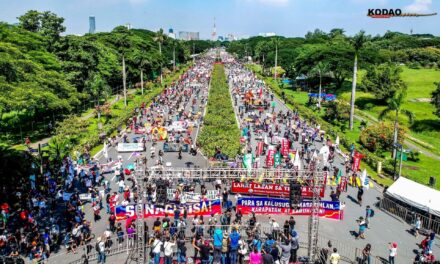Filipino Workers in the Middle East:AT THE RECEIVING END OF ISRAEL’S ‘COLLECTIVE PUNISHMENT’
The best evacuation plan for trapped Filipino workers in Lebanon is for the Philippine government to demand that Israel stops the war
BY HERBERT DOCENA
As more Israeli bombs fall from the skies over Lebanon, at least one Filipino worker is feared dead and over thirty-four thousand others are trapped with nowhere to go: the airport has been hit and roads and bridges leading out of the capital have been damaged. The only chance to move is if the bombing stops – even temporarily. Lebanese Prime Minister Fuad Siniora has pleaded for a ceasefire but Israel – seconded by the United States – insists the bombing should go on.
Since the assault began, Israel has been bombing housing complexes, power stations, and other civilian infrastructure. Last Saturday, nine children were burnt alive when the convoy they were riding to flee the country was hit by Israeli missiles. So far, over a hundred civilians have been killed. Filipino, Sri Lankan, Thai and other foreign workers may count in the next tally of victims.
Israel insists it is only defending itself from Hezbollah’s aggression and most media accounts report that this latest round of fighting was triggered by Hezbollah’s capture of the three Israeli soldiers. However, they rarely mention that it took place in a disputed zone on the border and that Israel is holding over 10,000 Lebanese and Palestinians in jail – not to mention the millions of Palestinians living in the virtual jail that is the Gaza strip.
Prior to the Hezbollah raid, Israel was laying the whole of the Gaza strip to waste in retaliation for the capture of an Israeli soldier. For weeks, the Israel Defence Force had been shelling Gaza’s civilian infrastructure thus cutting off over a million Palestinians from power, water, and medical services. Over forty civilians – many of them children – had been killed in Israeli operations. More than 100 Palestinian parliamentarians had been abducted. And perhaps most shocking of all was the massacre of June
9 when Israel shelled a beach in Gaza, killing most members of a family picnicking by the sea.
It appears that Hezbollah – an Islamic movement with social, political and military wings and massive popular support — carried out the raid in an attempt to open a second front on Israel and in response to the atrocities against the people of Gaza. Israel’s excessive counter-response is clearly aimed to show its own military might and to turn Lebanese public opinion against Hezbollah. What’s more, by linking Hezbollah to Syria and Iran, Israel is adding fuel to the fire already stoked by the US, thus risking a full-scale regional war. Israel’s own provocative actions are further endangering tens of thousands more of Filipino workers within its borders and beyond.
Seen from a broader perspective, this latest round of bloodletting is a consequence of the complete collapse of the Palestine-Israel peace process. Israel has shown no commitment to peace: indeed, the expansion of settlements, construction of the separation wall, and the harassment, arrest and murder of Palestinians continues unchecked. Hezbollah’s actions in capturing the Israeli soldiers was an attempt to force an end to Israel’s impunity.
Many analysts believe that Israel’s full-scale attack on Lebanon is part of a larger strategy to once and for all rout two formidable enemies in the region — the Hezbollah and the Hamas — in order to impose a final settlement of the Israel-Palestine conflict on its own terms. In implementing this strategy, the Israeli government seems willing to violate international law. Under the Geneva Conventions, disproportionate use of force and collective punishment are clearly outlawed.
The Department of Foreign Affairs maintains that the Philippines is a “neutral party” in this crisis. But with the government not saying a word about Israel’s disproportionate use of force and its violations of international law, to be quiet in the face of aggression is to be “neutral” in favor of the aggressor. To stay silent is to abandon Filipino workers, along with the rest of the Lebanese population, now facing the full wrath of Israel’s “collective punishment.”
As the Philippine government struggles to evacuate these Filipinos from Lebanon, the best evacuation plan is still for the the Philippine government to insist that the bombings should stop. The government should break with the United States on this question, call for an immediate ceasefire, and join other countries at the United Nations General Assembly in calling for an end to the war and a just resolution to the crisis. Moreover, it should immediately recall its ambassador from Israel and severe its ties with that country until it ends its occupation of Palestine.
Not only would these actions signal a principled foreign policy but they would also to protect the welfare of the tens of thousands of Filipino workers in the greater Middle East. Filipino workers in that region will be insecure so long as Palestine remains under occupation. It is already tragic that so many of our country men and women are forced to work in strife-torn areas to survive. It would be even more tragic if their government tacitly supports the actions of Israel and looks on helplessly as they become “collateral damage” of its war.#
Herbert Docena is a researcher with Focus on the Global South, a policy research institute.








